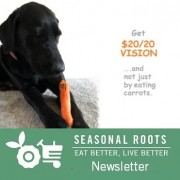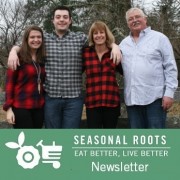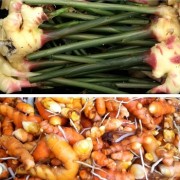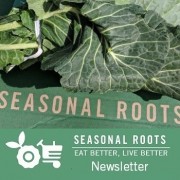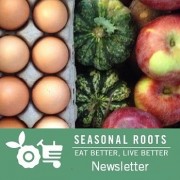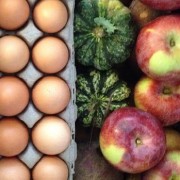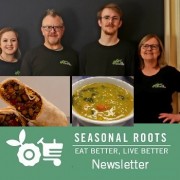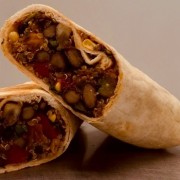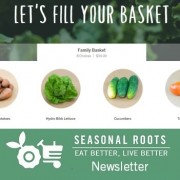You won’t find this “Truly Scrumptious” local food in the grocery store but it’s just as convenient
– By the Veggie Fairy Team
There’s more than one way to eat your local veggies — and you don’t necessarily have to go to the trouble of cooking them up yourself. That’s because local produce is also a big part of many of our locally made artisanal foods, like Truly Scrumptious in Richmond, Va.
Truly Scrumptious specializes in frozen, ready-to-heat prepared foods that are locally sourced whenever possible and bursting with flavor. Freezing freshly made, handmade food makes it convenient to serve, and also makes it more flavorful and nutritious than most other convenience foods. (For more on that, read our post on the benefits of freezing fresh food.)
For the inside scoop on convenient local food, we talked with Mela, the British chef who grew up on the west coast of Scotland and now makes Truly Scrumptious so scrumptious in Richmond, Va. And she’s too modest to tell you this part herself, so we will: Back when she lived in London, she worked for a company that held the Royal Warrant — catering events at Highgrove, Charles and Diana’s private residence, and Buckingham Palace garden parties. Cool beans!

VEGGIE FAIRY:
The flavors of everything you make really stand out! How do you do it?
MELA:
I don’t make the typical soups you find in the grocery store. Having traveled a lot in the Far East I like my food to have big flavor. I’m inspired by Indian, Thai, and Morroccan flavors and then I make it my own — so it’s always full flavored but not too spicy. I use local produce whenever it’s available, and that’s going to taste so much better, too. Plus you know where it comes from, how they grow it, that it’s fresh picked. Then freezing it gives me the ability to offer a much greater variety. Everything’s been tested, so I know it will be fine when it’s reheated.

VEGGIE FAIRY:
Did you go to culinary school to learn all this?
MELA:
Actually my degree was in engineering! But what I really loved to do was cook, so I was always cooking for the guys in the class and on field trips. Then I came to the U.S. on a work exchange program. I wound up working for top notch restaurants in Colorado and on Martha’s Vineyard, where I met my husband Robert, and my love of food took over.
VEGGIE FAIRY:
So how did you wind up Virginia?
MELA:
Robert is from Roanoke and he wanted to come back to Virginia. So I moved to Richmond without having ever visited it. Turns out I’m very happy here! Once my children were a little older, I started Truly Scrumptious in 2007, and I focused on serving businesses and private entertaining. Then in 2010 the farmers market scene in Richmond exploded. I noticed the quality and variety of produce I could pick up in the markets and I knew I could use it as the basis for prepared ready-to-eat foods. One of the family farmers I work with is G Flores Produce, on Virginia’s Northern Neck.
(FAIRY NOTE: The Flores family has been part of our home-delivered farmers market almost since the beginning! That’s their produce below, which went into Mela’s Roasted Virginia Winter Vegetable Bisque, available in the market this weekend.)

VEGGIE FAIRY:
Do you have a set menu?
MELA:
No, that’s the best part. Everything’s seasonal. I create different entrees to utilize what’s being harvested. It’s creative and exciting to be doing something new all the time. One week one of the local farmers had beautiful bok choy, so I turned that into a delicious bok choy and mushroom soup. I want to let that local produce shine. That’s the most important thing.
VEGGIE FAIRY:
What’s been the biggest challenge?
MELA:
Applying to the health department and the agriculture and consumer services department for a license seemed scary. It’s intimidating as a person who doesn’t have a big team of business advisors. But once I did it, it turned out it was straight forward and easy and gave me a sense of satisfaction of having done it myself. Then there were the logistics of figuring out the best place to sell what I was making and a place to make it. You have to have an inspected kitchen. I’m lucky enough to use a lovely large commercial kitchen in Bon Air United Methodist Church. They let me rent the kitchen and I cater activities for the church like Wednesday night dinners. I’ve been working out of that kitchen for 12 years now. So creating it all from the ground up by myself and then seeing it take off has been the biggest challenge but also very satisfying.
VEGGIE FAIRY:
So you’re running a business and also doing the sourcing and cooking. How do you get it all done?
MELA:
Robert helps at in-person farmers markets. Our son Jack, who’s 21, handles deliveries. And our daughter Molly, who’s 17, is my righthand lady. If I need cupcakes decorated, she’s on it. She’s also a good calming influence for me! I count on the farmers, too. I love meeting and getting to know local farmers and seeing them week by week. They’ll ask me if I want such and such… It’s all very rewarding. I’m so lucky to be involved in something I enjoy 100%. It’s my interest, not just my job.

VEGGIE FAIRY:
For some of us, cooking is a chore. What is it about cooking for others that you enjoy so much?
MELA:
For me, it’s providing families with something that’s nutritious, flavorful, locally sourced, and convenient. I love knowing that people really appreciate being able to have my home-cooked food in the freezer to pull out, heat up, and then sit down and eat a scrumptious meal. Some of my customers buy five soups and take that to work each day instead of buying fast food for lunch. It’s gratifying to know I’m making life easier for other people with food that’s locally sourced, locally handmade, and nutritious. I do try to make it as healthy as I can. I use high quality olive oil, spices, and a lot of my soups are vegan. Not because they have to be but because the recipes lend themselves to using coconut or almond milk.
*
You can find Mela’s convenient local food in the Extras section of our home-delivered farmers market. You can also visit Truly Scrumptious on Facebook, or check out the Truly Scrumptious website.
ABOUT SEASONAL ROOTS
Since 2011, Seasonal Roots’ online farmers market has connected Virginia families with local family farmers who use sustainable, humane practices. Our veggie fairies – mostly moms who believe in living better through scrumptious, healthy eating, being kind to animals, protecting the environment, and spreading joy – home-deliver freshly harvested produce, pasture-raised dairy, eggs, and meat, plus wholesome artisan fare. We empower our members to eat better and live better with more nutritious, flavorful food that’s good for us and good for the planet. More info at seasonalroots.com.
